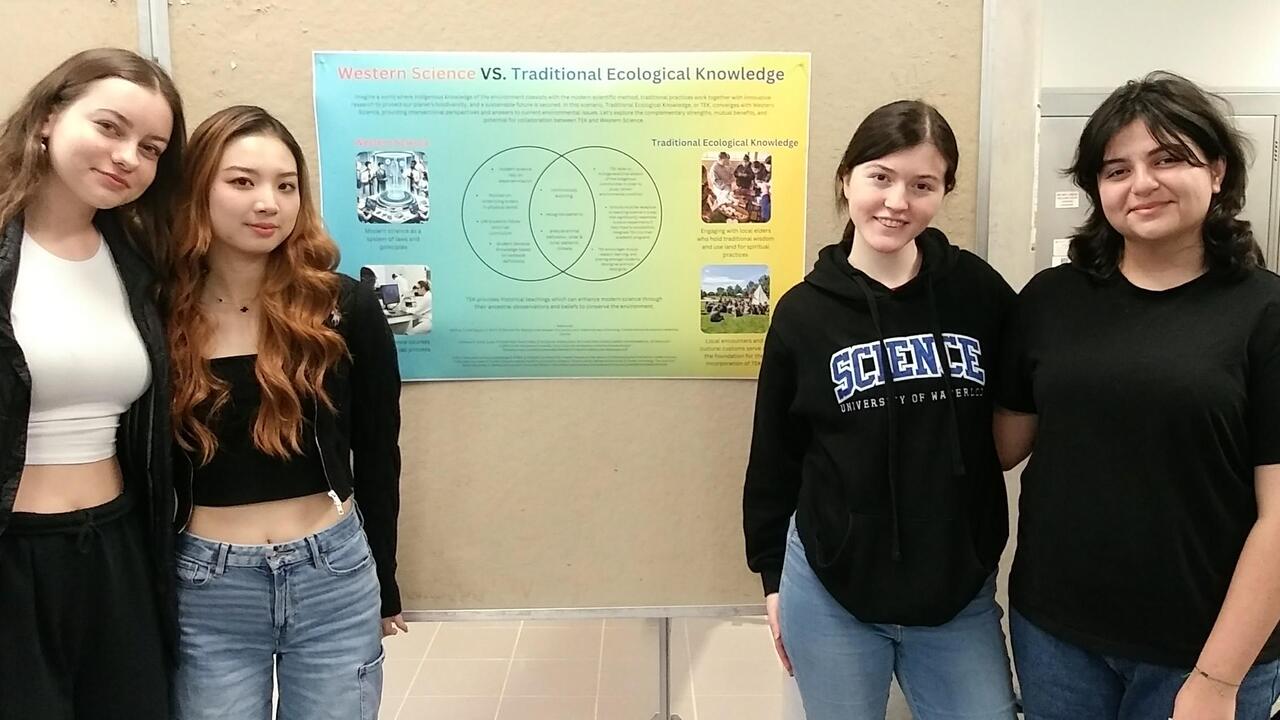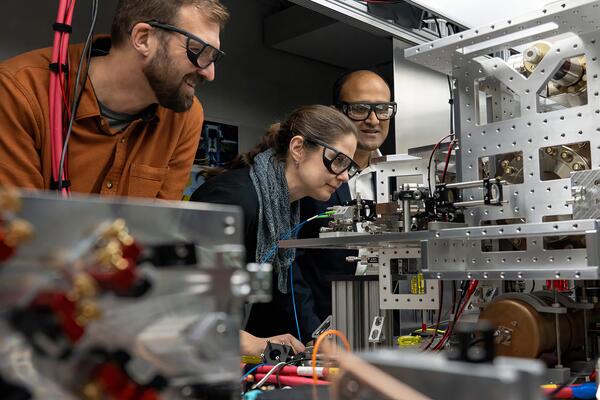
Indigenizing science education
Students broaden their perspectives through exploring the relationship between Indigenous knowledges and Western science

Students broaden their perspectives through exploring the relationship between Indigenous knowledges and Western science
By Sarah Fullerton Faculty of ScienceMaddy Craig, Amitees Ghiasian, Daria Gerus, and Vivian Huang embraced new perspectives in their Communications for the Sciences course group project entitled, “Western Science vs. Traditional Ecological Knowledge.” The project deepened their understanding of science by exploring Indigenous Peoples' history and knowledge-sharing culture and comparing it to Western science.
These students were among the first to experience the newly Indigenized Science Communication requirement developed under the guidance of Savannah Sloat, the Manager of Science Indigenous Initiatives within the Faculty of Science. They were taught four models focused on Traditional Ecological Knowledge (TEK). This interdisciplinary framework explores the relationship between Indigenous knowledges and science, focusing on the interconnection between science and the environment.
The group found this unique perspective eye-opening. “We were enthralled by this project,” Craig says. “We had the freedom to select a topic from any unit within the course, and we chose Traditional Ecological Knowledge because of its profound impact on us.”
The project led the group to reconsider their understanding of science and recognize cultural biases within scientific exploration. They discovered that Western science heavily relies on experimentation and a system of laws and principles, whereas TEK emerges from multi-generational wisdom and engagement with the natural world. For example, Indigenous practices like using nitrogen-rich soil to heal wounds have been used by Indigenous communities for centuries with great results, but it is a concept that is only now being studied by modern scientists.
The group quickly discovered that Western science has an element of exclusivity within academia that requires a deep understanding of basic scientific principles before progressing to more complex topics. In contrast, TEK is taught from childhood through generational storytelling, relying on the wisdom of elders and knowledge keepers rather than structured experimentation.
The group highlighted the importance of converging Western science with TEK to provide intersectional perspectives and answers to ongoing environmental issues. “Traditional Ecological Knowledge provides historical teachings which can enhance Western science through their ancestral observations and beliefs to conserve the environment,” Craig says.
The Faculty of Science is committed to being a leader in providing Indigenous-centred education at the University of Waterloo by finding natural places to incorporate Indigenous frameworks into courses as part of a broader institutional effort to foster reconciliation, decolonization and indigenization on campus and within our studies.

Savannah Sloat - Manager, Science Indigenous Initiatives in the Faculty of Science
“The impact of this project extends beyond academic achievement - it shows that students are eager to expand their cultural understanding,” Sloat says. “It highlights how Indigenous studies enhance the Science curriculum at the university by fostering a more inclusive approach to science education.”
Learn more about how the Faculty of Science is embedding Indigenous knowledges and spaces into science scholarship on Waterloo News.

Read more
And a new model for how quantum research is shared — opening doors for the next generation of scientists and entrepreneurs

Read more
Here are the people and events behind some of this year’s most compelling Waterloo stories

Read more
From transforming solutions for homeownership to advancing health care interventions, Waterloo talent continues to disrupt industries and drive change
The University of Waterloo acknowledges that much of our work takes place on the traditional territory of the Neutral, Anishinaabeg, and Haudenosaunee peoples. Our main campus is situated on the Haldimand Tract, the land granted to the Six Nations that includes six miles on each side of the Grand River. Our active work toward reconciliation takes place across our campuses through research, learning, teaching, and community building, and is co-ordinated within the Office of Indigenous Relations.